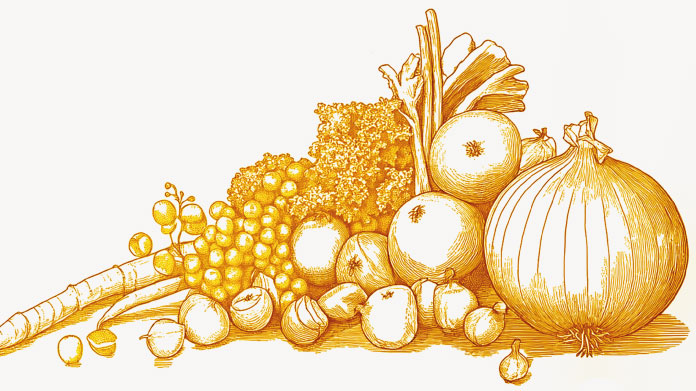The 3 best minerals for the immune system
Do you know which three minerals best support normal immune system function, according to the European Food Safety Authority (EFSA)? Discover how these minerals work and which foods contain them.

Selenium
Selenium is a trace-element the name of which is taken from the Greek word for ‘moon’, selene, (in a similar way to the closely-related element tellurium, which gets its name from the Latin for ‘earth’, tellus). This essential micronutrient helps maintain healthy hair and nails, normal thyroid function, etc.
Selenium and immunity
Selenium is also known for the role it plays in the body’s immune responses, particularly through its incorporation into selenoproteins (1). It is thus considered by the EFSA to support normal immune system function (2).
Which foods are rich in selenium?
The best dietary sources of selenium are herring, canned tuna, seafood, pork chops, offal, dehydrated Brazil nuts … You can also take a selenium supplement, the most bioavailable form being selenium (such as in the product Selenium).
Iron
Iron is a very important trace-element , a component of both hemoglobin in red blood cells, and myoglobin in muscles (both of which are essential proteins for the oxygenation of cells). There are two forms of iron: haem and non-haem iron. This mineral plays a role in reducing fatigue, and in ensuring both normal energy metabolism and normal cognitive function ...
Iron and immunity
We also know that iron affects immunity(3). When iron metabolism is disrupted, for example, it is known to have an impact on the body’s natural defenses. Thus according to the EFSA, iron supports normal immune system function (4).
Which foods are rich in iron?
Absorption of non-haem iron from the diet is only around 5%. It is found in legumes, tofu, eggs,, dairy products ... Haem iron on the other hand, is absorbed considerably better by the body (25%-50%) and is thus much more beneficial. It is found in animal-source products only: black pudding (or sausage), lamb’s kidneys, chicken livers, braised beef … If you’re lacking in iron, you can also take an iron supplement, such as Iron Bisglycinate.
However, before starting to supplement with iron, it’s important to consult a health professional for confirmation that you are indeed iron-deficient.
Zinc
Zinc is a trace-element required for the activity of more than 200 enzymes in the body. It is primarily concentrated in muscles and bones. It plays a role in the normal synthesis of DNA and proteins, and in maintaining healthy skin, hair, nails and bones, as well as in protecting cells against oxidative stress ...
Zinc and immunity
Zinc also plays a key role in immunity. For example, zinc ions are involved in regulating intracellular signaling pathways within innate and adaptive immune cells (5). So, as the EFSA confirms, zinc is a mineral that supports normal immune system function (6).
Which foods are rich in zinc?
Oysters, calves’ liver, wholemeal bread, pecan nuts and dried figs are all rich in zinc. You can also supplement with zinc orotate, a form of zinc bound to an organic substance which enables it to pass freely into the bloodstream. Zinc orotate is thus significantly better absorbed than other forms of the mineral (choose, for example, the product Zinc Orotate).
To obtain the benefits not only of different minerals, but also vitamins that support normal immune system function, you could take a multivitamin supplement. Good options, for example, include the multivitamins Daily 3® (taken 3 times a day) or Daily 1® (just once a day), both of which are packed with minerals and vitamins.
References
- Avery JC, Hoffmann PR. Selenium, Selenoproteins, and Immunity. Nutrients. 2018;10(9):1203. Published 2018 Sep 1. doi:10.3390/nu10091203
- https://www.efsa.europa.eu/fr/efsajournal/pub/1727
- Cherayil BJ. Iron and immunity: immunological consequences of iron deficiency and overload. Arch Immunol Ther Exp (Warsz). 2010;58(6):407-415. doi:10.1007/s00005-010-0095-9
- https://www.efsa.europa.eu/en/efsajournal/pub/1215
- Wessels I, Maywald M, Rink L. Zinc as a Gatekeeper of Immune Function. Nutrients. 2017;9(12):1286. Published 2017 Nov 25. doi:10.3390/nu9121286
- https://www.efsa.europa.eu/en/efsajournal/pub/1229
Keywords
8 Hours
Order was shipped on time and packaged…Wonderful Jobs!
Order was shipped on time and packaged excellently.
DMHoge
6 Days
great products and prices
great products and prices
Marie
12 Days
Easy to navigate site
Easy to navigate site, had what I was searching for, good price. easy order-check out
James Tucker
18 Days
My skin is clearing up nicely!
Pretty good for my skin so far.
Christian
20 Days
The new packaging is excellent
The new packaging is excellent - finally! No more squashed boxes and torn envelopes.
GORAN
21 Days
Great Product
Great Product
Larry Garrett
25 Days
Quick shipping
Quick shipping; good price. No issues!
Mary McCarty
27 Days
Thr product is very good and is helping…
Thr product is very good and is helping me on my health. Then is always on time
LUGO Luz
29 Days
Buying was fine
Buying was fine. I had problems with the website not recognizing my login info, and had to call to get it fixed. Other than that, everything was good.
David S. Clark
30 Days
Your super maca and super ginseng are…phenomenal
Your super maca and super ginseng are phenomenal supplements that compliment each other when taking them together. Fantastic feeling of well-being and lots of mid day energy without the crash.
Keith Mason
32 Days
I have had amazing results with every…
I have had amazing results with every supplement I've purchased. I am extremely satisfied with this company
kirstin Torres
32 Days
Fine products
Fine products . They are on the leading edge of online supplements. The only issue -so far-is they sometime run out of subscription items.
Jason Argos
35 Days
The ordering process is very user…
The ordering process is very user friendly and the products always come in a timely manner.
CARTER Rhonda
36 Days
The price for Dr
The price for Dr. Pero's AC-11 is reasonable and in line with his views. (my former colleague). Keep it pure.
CAMPBELL Clayton
39 Days
Right on every time.
Right on every time.
Arthur Nicholas




